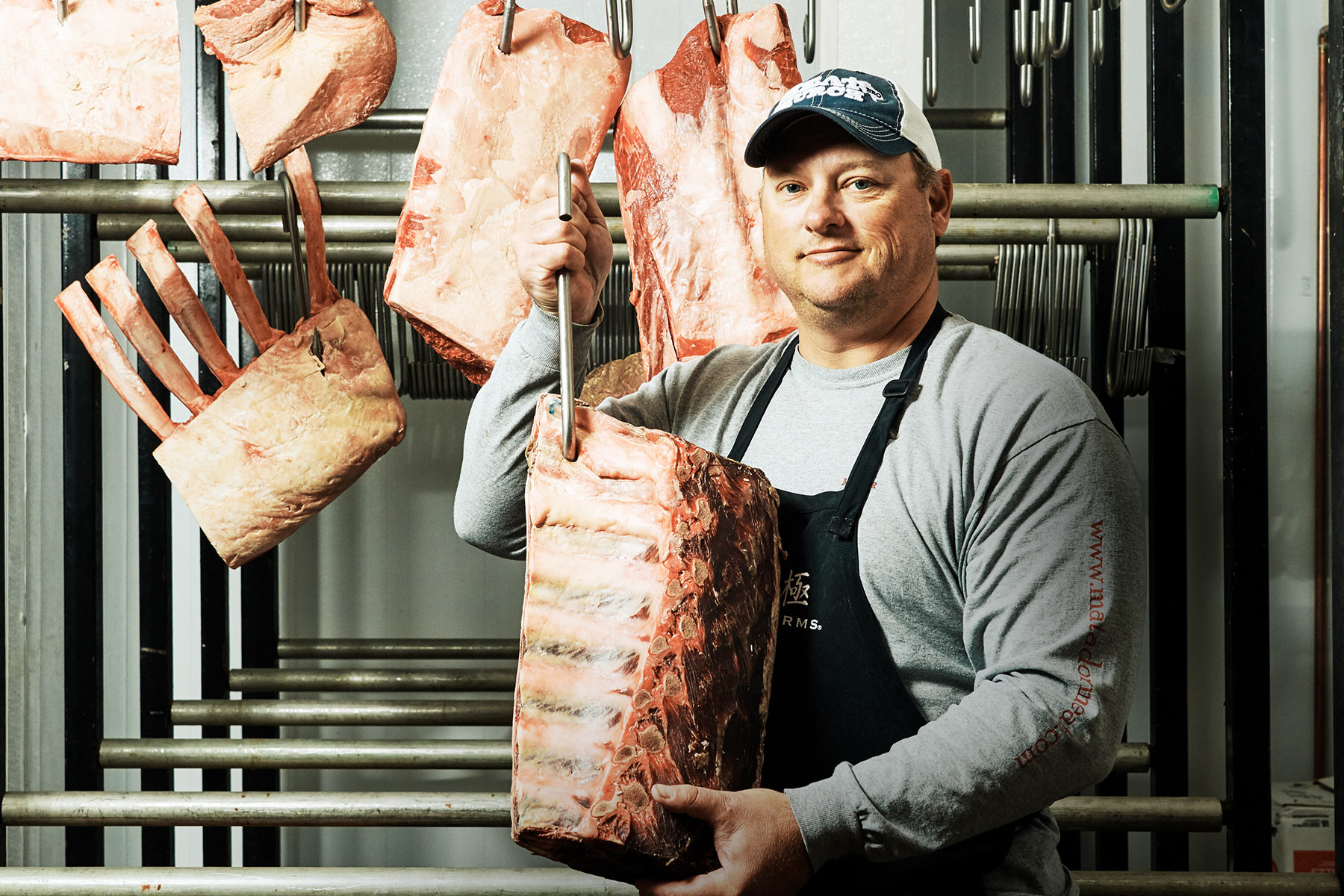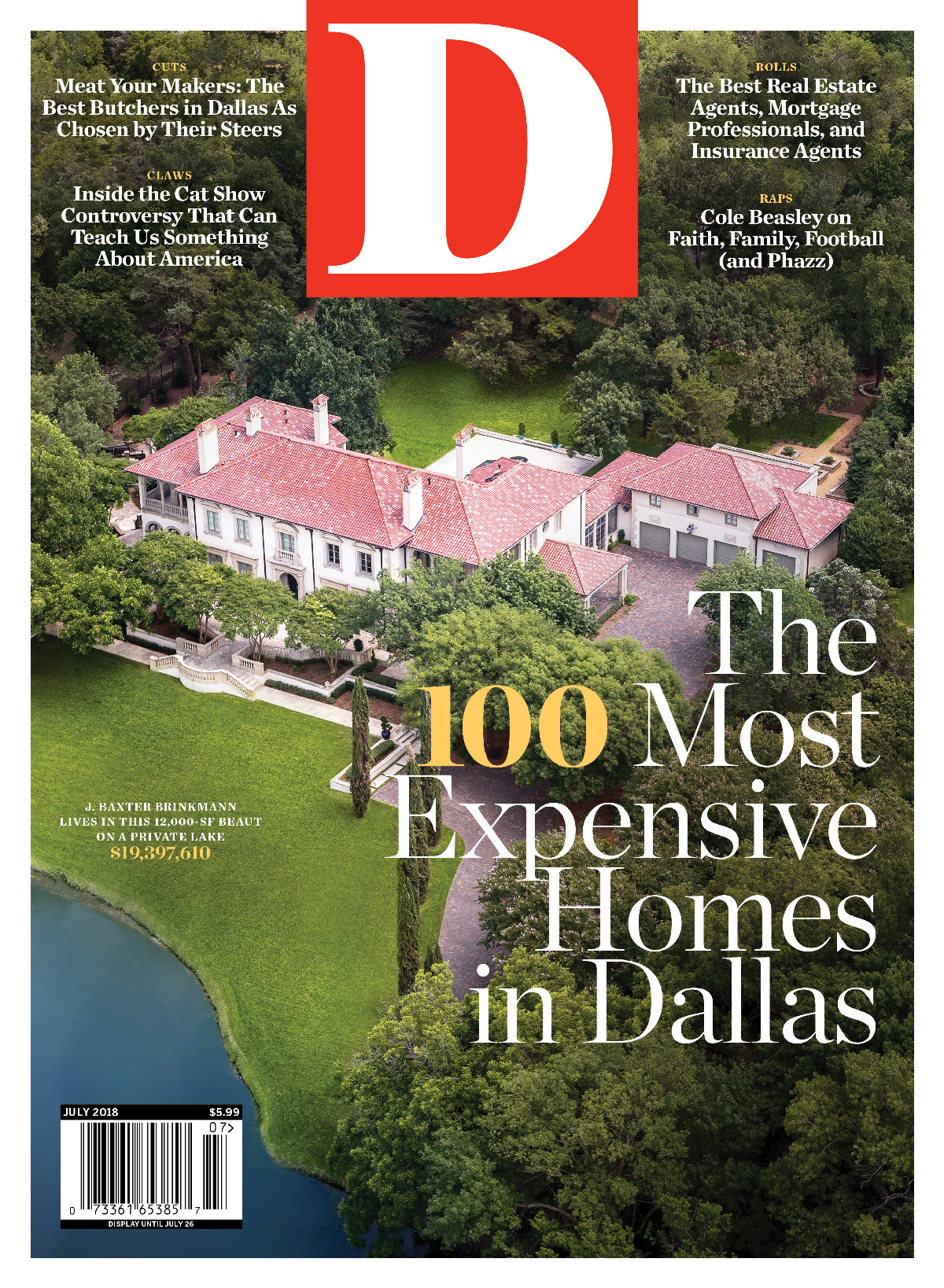Matador Meat & Wine
Matador Meat & Wine has nothing to do with Spanish culture, though Matt Peterson has often been asked that question. The matador is instead a reference to the Texas Tech mascot that came before Raider Red—the Masked Rider, mounted on horseback with a scarlet cape. Peterson’s wife, Colleen, is an alumna.
The couple opened their modern meat shop—where they also sell craft beer and local rubs, sauces, and seasoning—in Plano after finding themselves frustrated with the options for quality steaks outside the few-times-a-year steakhouse splurges. Peterson hired a veteran butcher with 40 years of experience, who trained the staff for more than a year and a half in the butcher’s craft.
The single Nebraska packing house from which the majority of the beef comes sources its cattle from family farms within a 150-mile radius. The steers have a sub-hour drive through the fields of Nebraska. Peterson has visited the packing house and knows the fields.
His prime Black Angus ground beef is kept juicy with trimmings and fat caps from the steaks, which are dry-aged for up to 20 days. Sausages have been a spur for creativity, from pork belly and brisket to filet mignon. Recently, Matador became the only retailer in the area for Snake River Farms, the prestigious Idaho-based purveyor of American Wagyu. Peterson has his sights set on a Wagyu burger. Editor’s note: Permanently closed in 2019.
Sara’s Market & Bakery
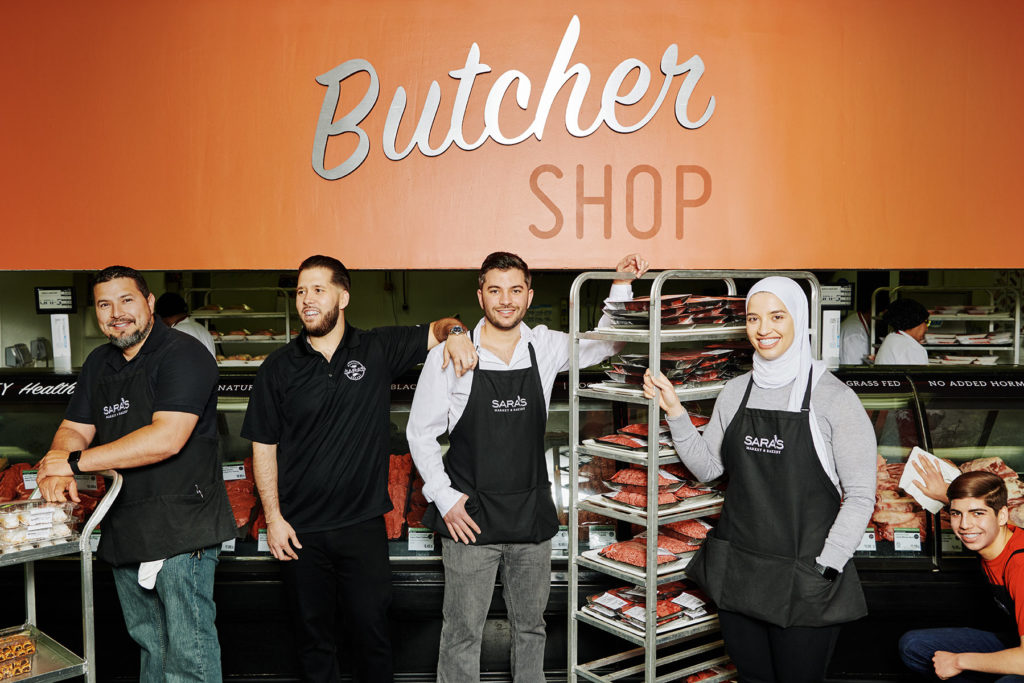
What began as a pita bakery 20 years ago has grown into a busy Mediterranean market with aisles of specialty goods, a flourishing produce section, and a meat market with six meat cutters and two clerks who speak six languages among them. The seven Bayan siblings, who once had summer jobs stocking shelves in the family-owned store and now run the show, insist on the high-quality standard they set: meat that is halal, but also pasture-raised, vegetarian-fed, hormone-free, and mostly antibiotic-free.
“Being a Mediterranean/Middle Eastern store, there’s always been a demand for lamb,” Duaa Bayan says. You can order local lamb that comes in whole twice weekly, raw kibbeh (Lebanese tartare), and lamb casing-wrapped sausages. Butchers who expertly portion lamb shoulders and cut tender cubes for grilling will also advise about cooking and pairing. For first-timers: prepared kebabs, such as beef-lamb kefta patted around skewers, the meat flecked with parsley and freshly ground spices, or lamb chops that can be simply grilled with olive oil and salt and pepper.
The Bayans grew up with a mother, Khaloud Mirza, who wanted customers to feel they were coming into her home, and so you’ll find pistachio cookies right out of the oven and an aisle of tea, along with the essential trinity of fresh herbs, cucumbers, and feta. “Mediterraneans love barbecue,” Zaid Bayan says. “Grilled vegetables and, of course, the pita tie it all together.”
The Meat Shop
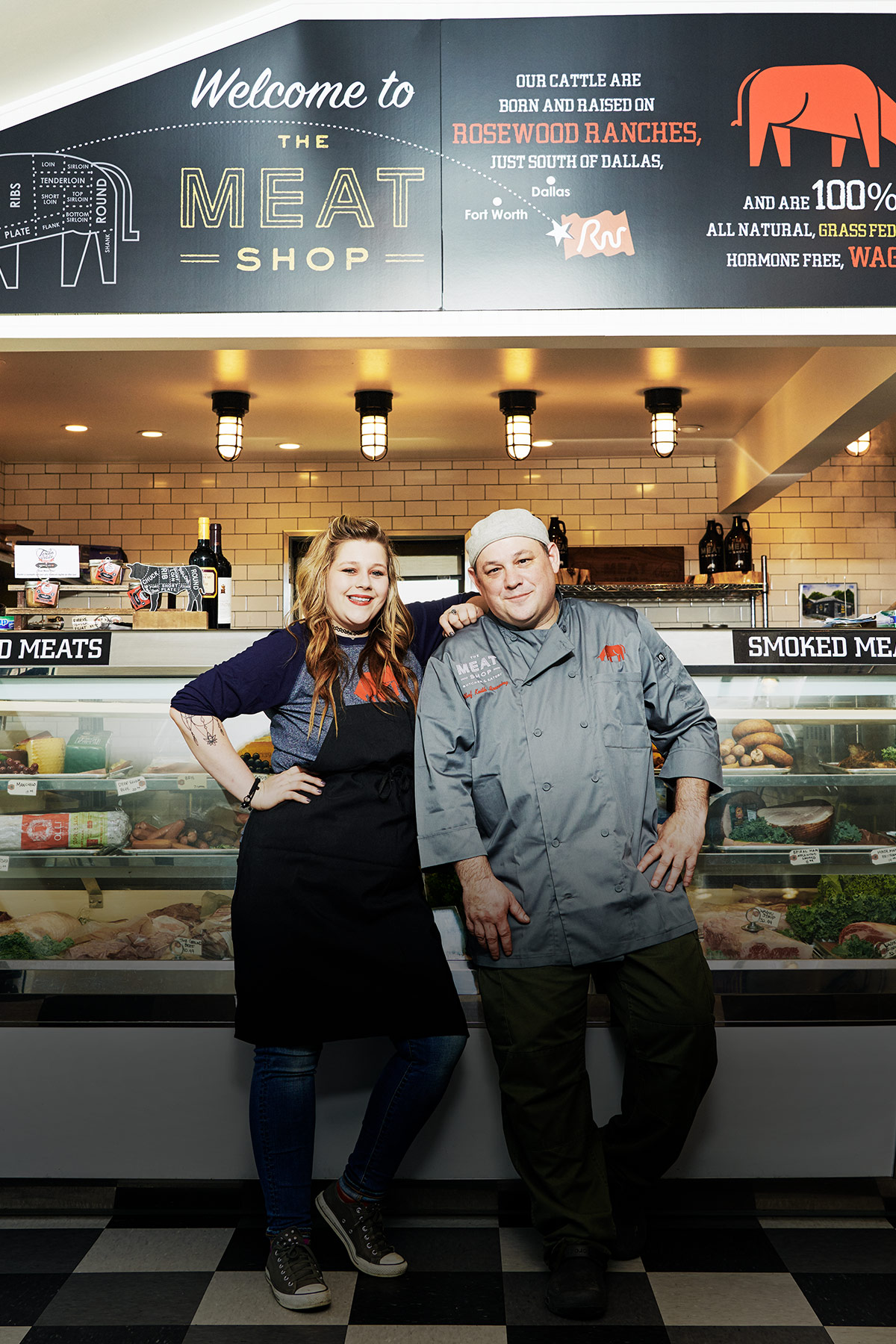
This light-filled, friendly spot opened in the spring on a trendy stretch of Lovers Lane. In the sunny backyard, it has a casual party vibe with cornhole games and the smell of a smoker tickling the air. When the weather cools down, Fridays mean cookouts with Friday Night Lights sangria, presided over by executive chef and butcher Keith Browning, often sporting a newsboy cap. Sunday evenings mean a sale on boutique meats before the shop closes for Monday and Tuesday. That’s what the owners of Rosewood Ranch wanted: a neighborhood meat shop where the butcher knows you by name. The beef—sourced from the ranch near Ennis owned by the Hunt family—speaks for itself. You’re getting single-origin Wagyu, with its unparalleled marbling.
“I’ve always had a passion for old-school butcher shops,” Browning says, referring to the ones he grew up frequenting on the East Coast. He’s got a sandwich board listing smoked steak hoagies and meat-shop dogs. But his butcher case also showcases Wagyu roast beef and house-made smoked beef belly, and there’s a grab-and-go fridge with pimento cheese, tomato jam, and rendered Wagyu butter.
Kuby’s Sausage House and European Market
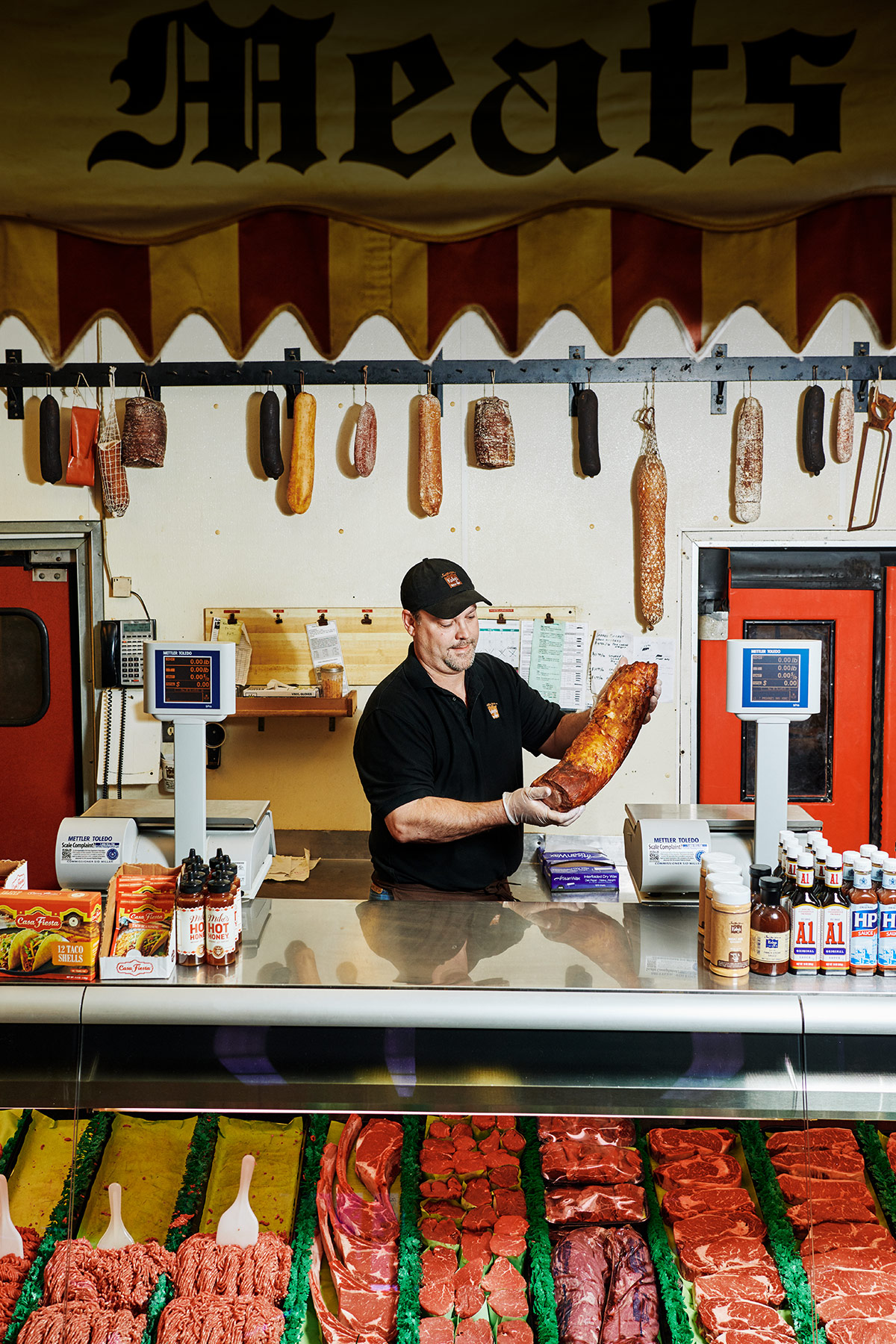
Karl Kuby Jr. never intended to go into the family business. His father didn’t want him to; it’s a six-day-a-week job. Karl Sr. emigrated from Germany in 1956, but butchering has been the family business since 1728. Now that Karl Jr. has taken over the shop, Karl Sr. stops in on occasion to pass out gummy bears to the kids.
“The older I get, the more I realize what an impact this business has had on the community,” Karl Jr. says. “I’m seeing third, fourth, fifth generations of customers. Being here my whole life—I’m 51—I’ve seen customers come in and out. They treat me like family; I treat them like family.”
The shop is full of German imports, from pickles, tube mustard, and spaetzle to Karl Jr.’s cousin Dieter Probson, a Metzgermeister, or master butcher, from Trier, Germany. Beef is wet-aged until it is at least 24 days old, and chicken is delivered fresh daily. They make their own corned beef and pastrami, and will smoke just about anything: beef tenderloin, pork chops, baby back ribs, whole chickens. If you bring in your own fish, they will smoke it for you, too, and they’ll process your wild game at a separate 27,000-square-foot facility. “I tell everybody we’ve done alligator to zebra,” Karl Jr. says.
American Butchers
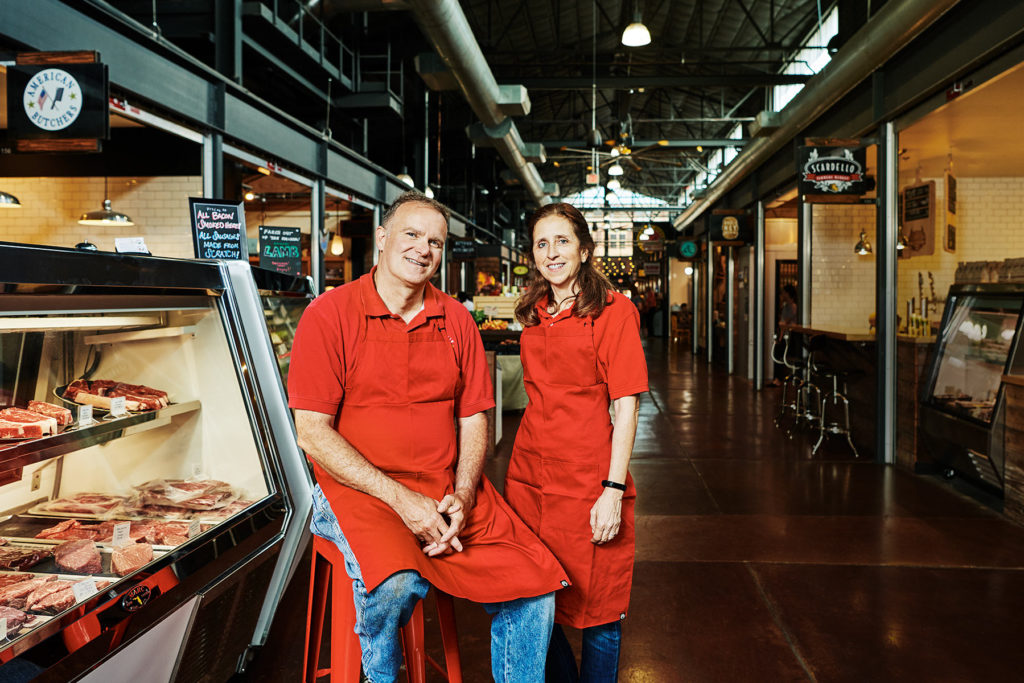
Calvin Wineland doesn’t do anything halfway. As an 18-year-old, when he wanted to become a blacksmith, he studied with legendary farrier Doc Butler. When he decided to become an Army helicopter pilot, he flew Chinooks and Black Hawks. And when he retired and decided to become a butcher, he created an unheard of model.
O
nce a week, or as needed, Calvin drives 11 hours to his home state of Nebraska where he and his wife, Desiree (a former Army helicopter commander), own a meat locker. They work with small ranchers from Texas, Oklahoma, Kansas, Colorado, South Dakota, and Nebraska who bring in their animals, usually one at a time, for slaughter. Calvin then drives the carcass back to American Butchers’ stall at the Dallas Farmers Market, where it is dry-aged on the rail for at least 14 days before it is cut to customers’ specifications.
“From the moment the animal leaves the farmer’s hands, I never have my hands off it,” Calvin says. “We want to get back to where you know where your product comes from. We have the name of the rancher on the package, and I have their number on speed dial. I can call them up and you can ask them about how the animal was raised.”
Calvin has a state-of-the-art smoker to make his own jerky and beef sticks, hams, brisket, pulled pork, smoked lamb, and even smoked bones for stock. If you want to try a new cut, you can pick it out and the chef two stalls down at Beyond the Butchers, the Winelands’ other venture, will demonstrate for you how to cook it.
“I want to become your family butcher, to cultivate that relationship,” Calvin says. “I want you to come again and again.”
Deep Cuts Dallas
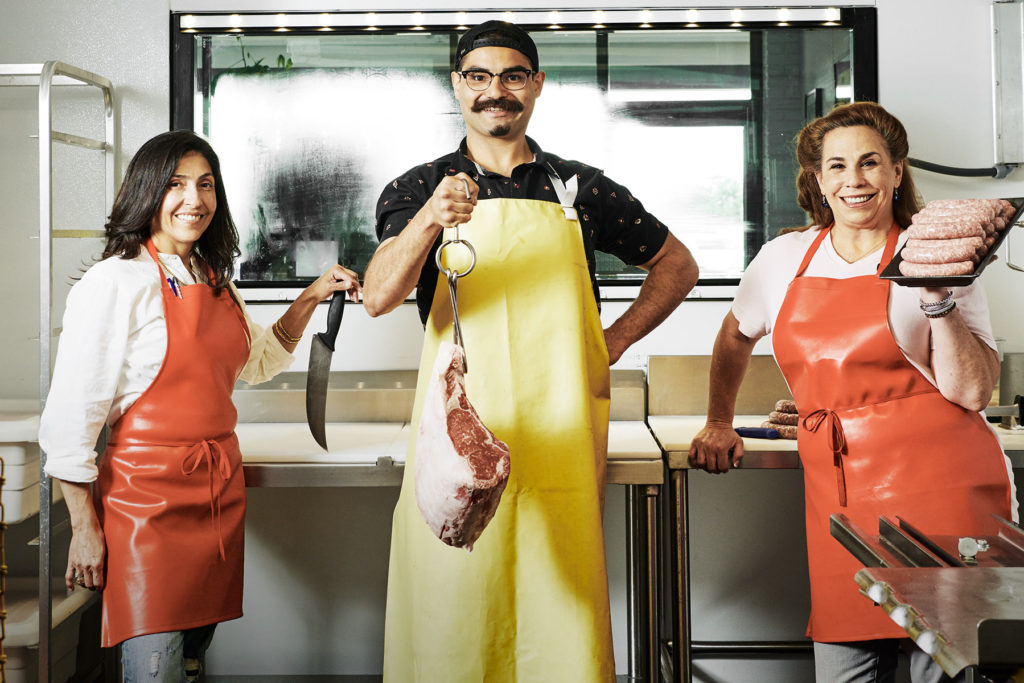
The first time Wendy Wolff (right) ever saw her business partner, Nathan Abeyta, break down a carcass, she broke down in tears. “I literally started crying,” she says. “The artistry and technique and the passion were just so beautiful.”
Abeyta started processing animals as a kid, hunting with his father. After studying at Texas A&M-Commerce, he apprenticed with Gary Hirsch at Hirsch’s Meats. Later he went to work in the meat department at Whole Foods, where he met Wolff and Deena Chaboya-Ellis (left). The three started talking and decided to open a shop together in Far North Dallas in 2016.
“Being in the area, we knew there was a big void for a butcher shop, especially one that was forward-minded,” Abeyta says. He wanted to process most animals from snout to tail. “We make Slim Jim-style beef sticks with beef hearts. We want to be a no-waste shop. Anything can be turned into something, and the animal deserves that respect.” He has sold the jaws of fresh pigs to dental schools and the skin to tattoo artists, and he renders the fat for tallow grease.
Deep Cuts carries pork from Chubby Dog Farm, Four U Farms, and Windy Hill Farm; duck and chicken from D’Artagnan Foods; fresh elk and venison; and bread from La Spiga Bakery in Addison. All sausages are made in-house from whole-muscle pork shoulder and the shop’s own spice blends. Its two primary beef vendors are Texas-based: 44 Farms in Cameron and Flatonia’s HeartBrand Beef. Both ranches emphasize open grazing, with no antibiotics and genetic traceability of the stock. “It really is the best,” Abeyta says. “Why buy out of state when there is so much good meat here?”
David’s Meat Market
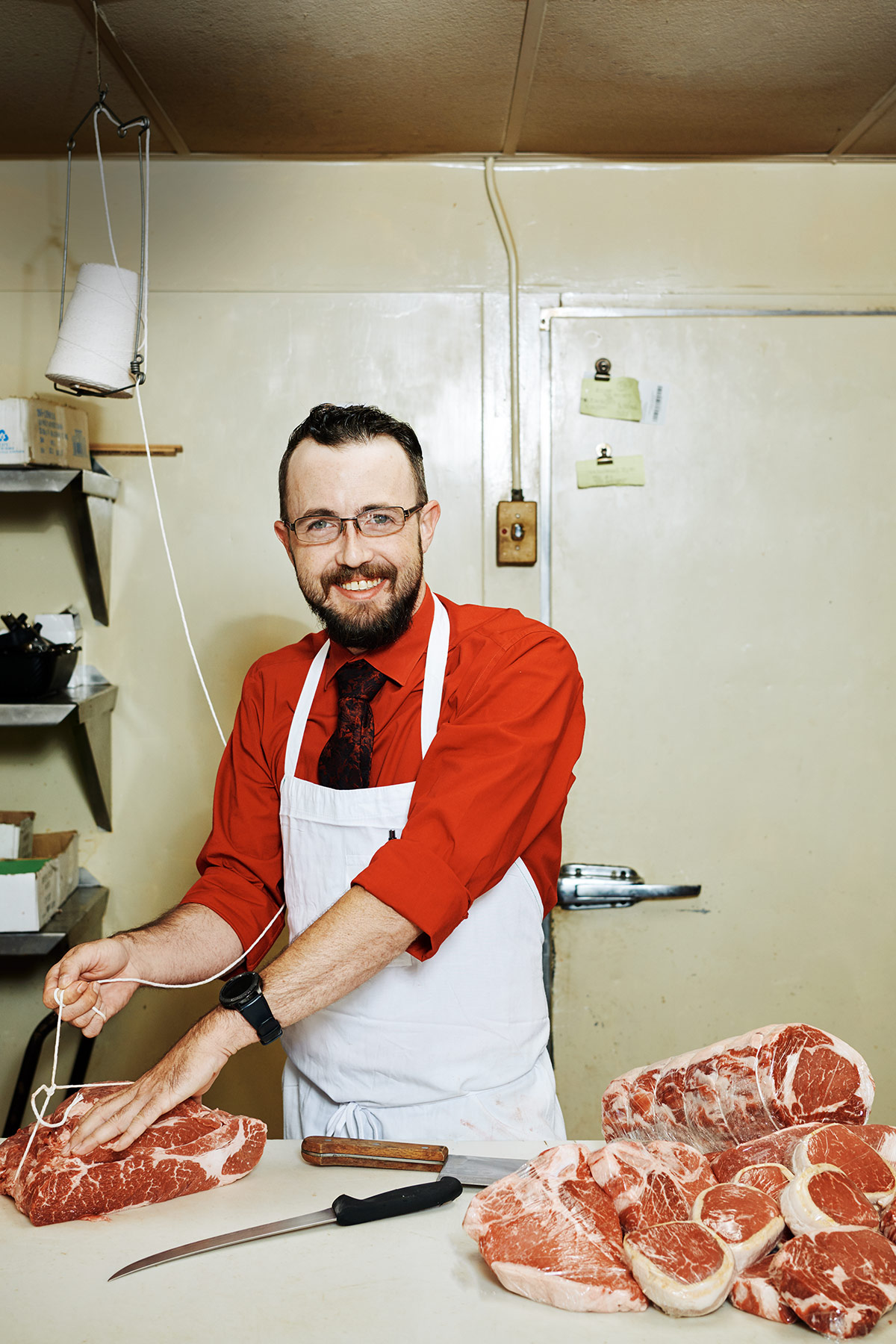
Devon McDougall bought David’s Meat Market from his grandfather, David Harris, three years ago. “It’s an amazing business,” McDougall says. “One family brought their babies in here and got them weighed on the scale. And now those kids are bringing their kids in and getting them weighed on the scale. It’s a neat thing to watch families grow up. And a lot of my customers have watched me grow up.”
His vision for the store is to work with Richardson High School’s agricultural department and turn it into a trade school, where students can learn the skills of a dying art, how to own a small business, and possibly start a franchise. He also facilitates an annual event, Death by Barbecue, to raise money for scholarships for aspiring butchers and ranchers who want to go to Texas A&M.
The shop makes 17 different kinds of sausages in-house, including beef franks and green apple cider brats. McDougall carries choice and prime corn-fed beef from Iowa, Kansas, and Nebraska. Ninety-five percent of the beef is Black Angus, because that’s what his other grandfather, Vaughn Rawlangs, raised. McDougall says that Rawlangs started the breeding program that led to the proliferation of Black Angus in Texas. “I watched our herd turn Red to Black when I was like 9, 10 years old,” McDougall says. “It was really cool.”
Hirsch’s Meats
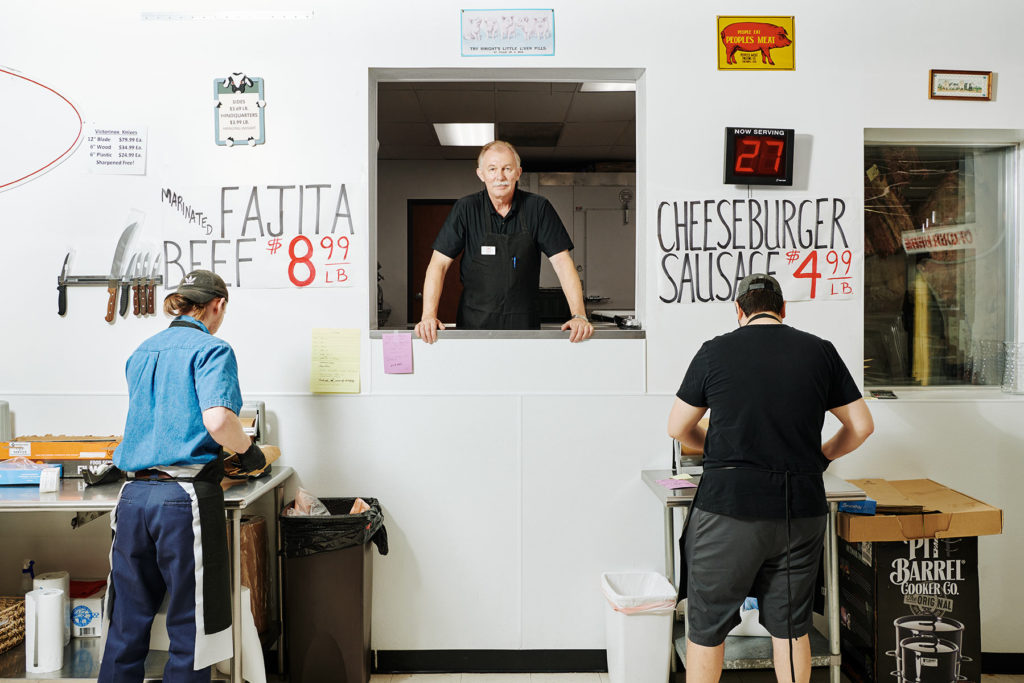
Step inside, and everything about Hirsch’s Meats signals a quintessential, old-fashioned butcher shop: the full horseshoe of glass-fronted cases, the old Coca-Cola sign, and the air of clean, skilled efficiency.
Gary Hirsch took a job as a meat market butcher in a family-owned grocery store at age 22 and fell in love with the trade. The meat market he opened in 1992 went from one employee to a knowledgeable staff that swells to 20 on weekends. He buys strictly for quality, drawing from six or seven suppliers for highest-level prime beef and Wagyu.
Take a ticket and wait to be served from the display of neatly arranged wares. There are separate mounds of ground chuck, round, and sirloin, plus bacon-laced sirloin on weekends. Bratwurst, Polish kielbasa, stuffed pork chops, and chicken wings are arranged in neat rows. You’ll also find frozen whole Cornish hen, duck, pheasant, rabbit, veal liver, and Frenched rack of lamb should you be so inclined. Wood chips and chunks for smoking are kept in tidy bins in the corner. They’ll also process your game.
With a jar of dill pickles crowning the deli counter and kids tugging at sleeves for Henry’s Homemade Ice Cream, you’ll almost be surprised that the men in ball caps at the checkout registers aren’t tallying your butcher paper-wrapped purchase by hand.
Rudolph’s Market & Sausage Factory
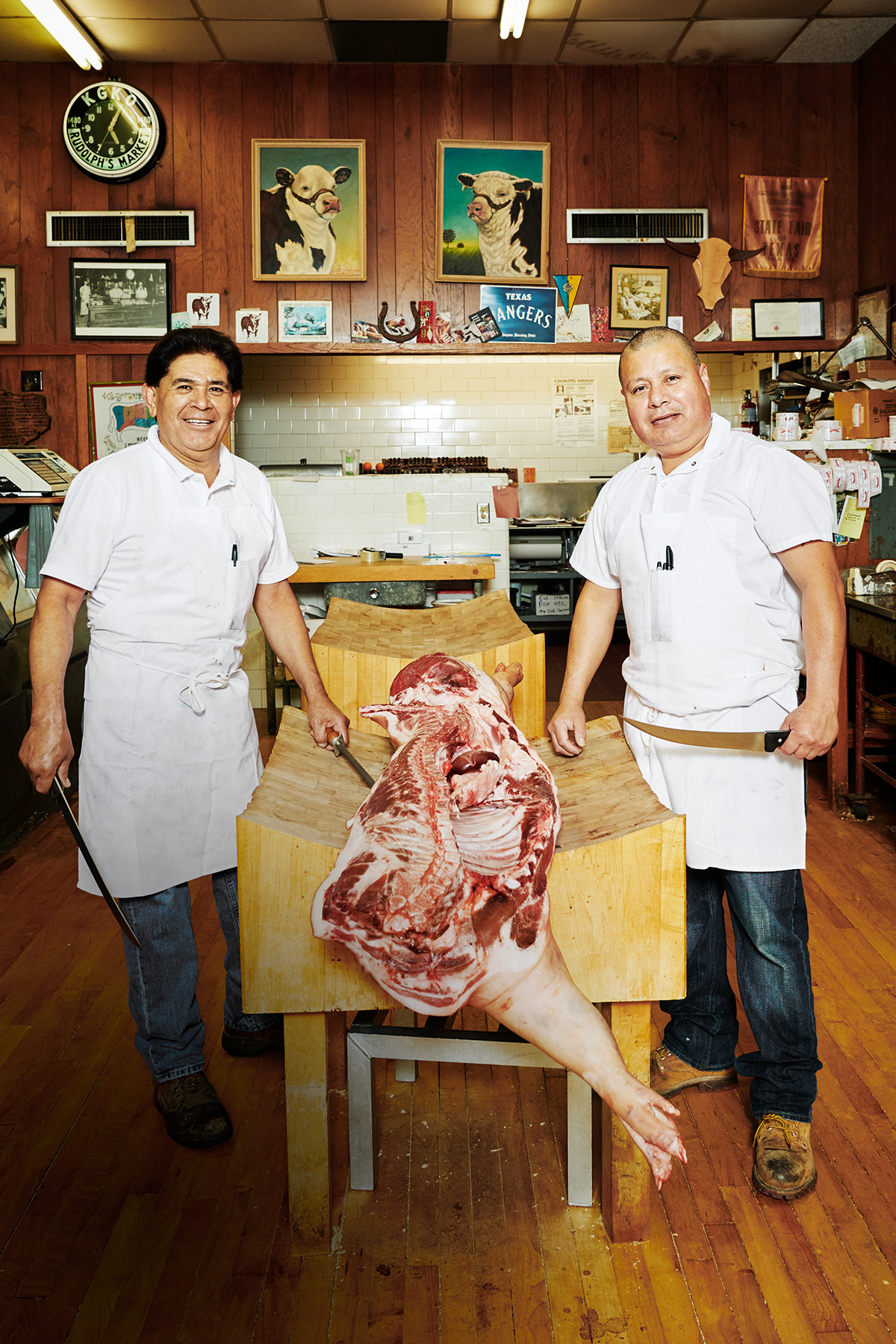
The butcher blocks, deeply grooved, remind you of the passage of time and of skill handed down over generations. Rudolph’s in Deep Ellum is pure old-world butcher shop, one step from its European origins.
Opened in 1895 by Austrian-born Martin Rudolph, the shop passed into the hands of Czechoslovakian Anton Pavelka, and then his nephew Cyrill “Sid” Pokladnik. Now Pokladnik’s grandson, Brandon Andreason, is in charge. Along the way, the passage of the torch down a line of European owners also meant a transmission of technical skills, as turn-of-the-century shop owners plied their craft.
What you find here are no-frills sausages—German, Italian, Czech, and Polish, fresh or smoked over hickory. The men behind the counter cleave mammoth slabs of flesh from a case that seems triple-deep with cuts. For ground beef, they custom-grind all-Texas beef in either all-chuck or a mix of short-rib, chuck, and brisket. The handsaws on the wall signal all the vestiges and dignity of their trade. On your way out, nod to the original sign, which has hung over the establishment since 1895.
Local Yocal Farm to Market
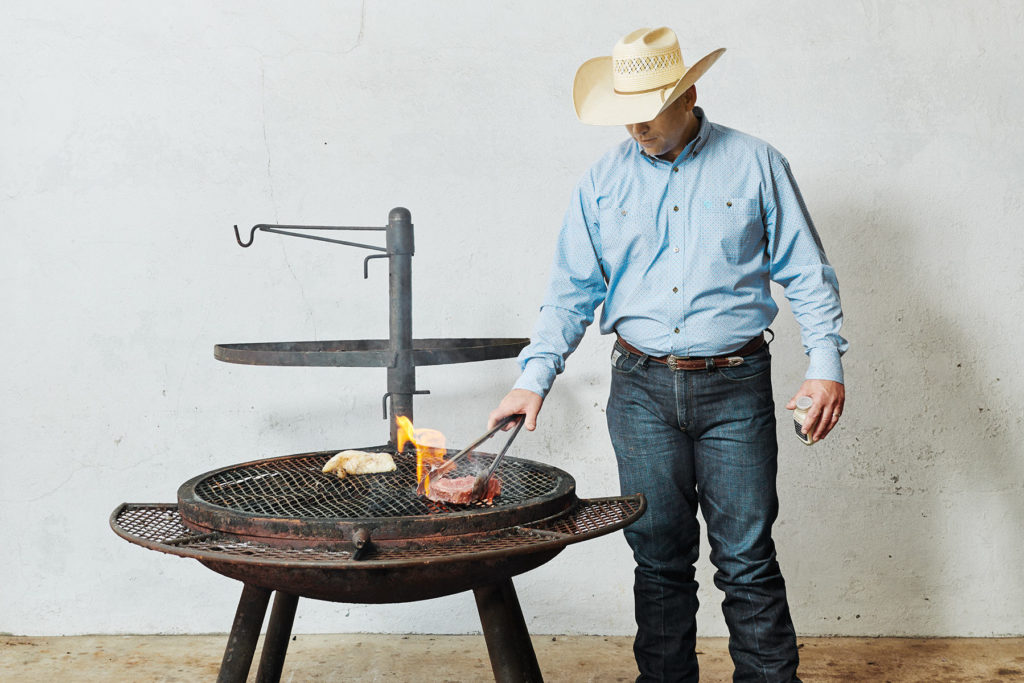
After he got married and his health-conscious wife went on The Maker’s diet, part of the Body by God regimen, Matt Hamilton started paying attention to the food he was eating. He decided the best way to get healthy meat was to raise his own.
Hamilton’s family still had a ranch in Coleman, Oklahoma, so he switched their cow-calf operation from pasture-finished to grass-fed beef. But he needed a new small-farming model to make it sustainable. “If I could become vertically integrated, if I became a little-bitty mirror image of the poultry industry, I could make a living for my family,” he says. And so, Genesis Beef was born, allowing Hamilton to bypass the various meat industry middlemen.
After outgrowing the McKinney Farmers Market, he opened Local Yocal Farm to Market just off the historic town square in 2010. He’s finishing out a 15,000-square-foot building on Louisiana Street that will house the new Local Yocal BBQ & Grill, which will be overseen by chef Adam West from The Porch and is planned to open in July. There will also be event space for Hamilton’s popular Steak 101 classes and five-course steak dinners, but an expanded meat market (which should open by the end of the year) will still be at the heart of the business.
“The grocery stores try to focus on the big three: rib-eyes, strip, filet,” Hamilton says. “We have 20 selections for you to choose from: bistro filet, petit strip, chuck-eye, McKinney steak. It’s not just all the same thing. It’s a meat adventure.”
Cooper’s Meat Market
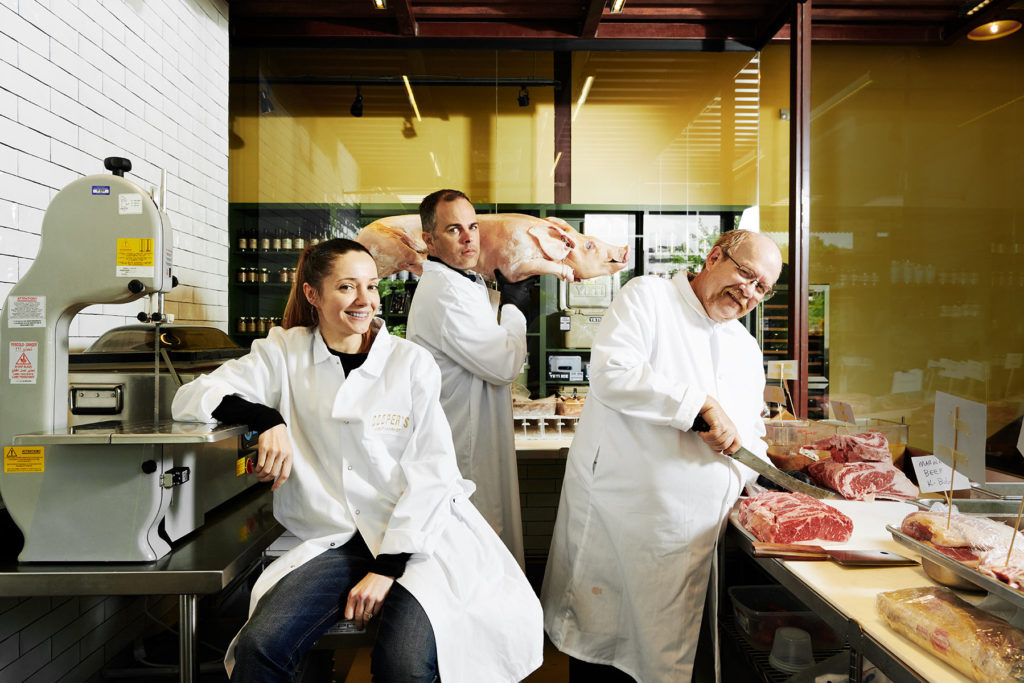
A family friend of the Johnsons opened the first Cooper’s Meat Market in San Antonio. Several years later, he was interested in selling the business. The scene was classic—a party, a pregnant pause. Mike looked at his son Michael and asked, “Well … ?” And so the Johnsons, who owned a ranch outside San Antonio, entered the meat market business 21 years ago, earning a reputation for their extensive selection of meats. This spring, Michael opened a second location in the Sylvan Thirty development in West Dallas, a missing link in a neighborhood without a butcher shop, or even a steakhouse.
The airy shop features a glassed-in demonstration room for front-row views of what they’re cutting for you, as well as the slabs they dry-age selectively for up to 90 days. The location also allows for sit-down dining. Johnson and partner Victoria Berezina hired executive chef Kenny Mills, with a résumé that includes The Capital Grille and Dallas Chop House, to offer a steakhouse menu. They also have a dessert chef. If you prefer takeout, a refrigerated case holds steakhouse sides such as green beans with bacon and steamed artichokes with ranch dressing to supplement your steaks and chops.
You can breeze in for prime Angus and American Kobe, or exotics like snake, frog, pheasant, and venison. They are the only local retailer for the vaunted New Braunfels Smokehouse, and there’s a popular off-menu fried chicken. “If someone needs something, we’ll get it for them,” Johnson says. But mostly, he considers their mission accomplished if they can offer a place where you can get a fine steak, seven days a week. And maybe a slice of cheesecake to go.
Get the SideDish Newsletter
Dallas' hottest dining news, recipes, and reviews served up fresh to your inbox each week.


